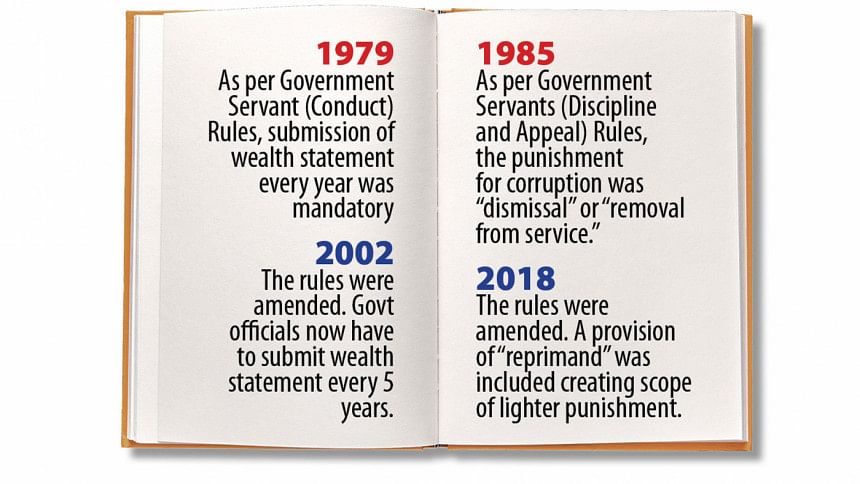Public Servants: Anti-graft laws, rules relaxed over the years

For over two decades, laws and regulations meant for curbing corruption by government employees have been relaxed, creating scope for officials to indulge in irregularities with relative impunity.
Both the BNP and Awami League-led governments made amendments to the rules, lightening penalties for corruption.
Through an amendment to the Government Servants (Discipline and Appeal) Rules (1985), the authorities in 2018 included "reprimand" as a penalty for corruption that has been proven through investigations.
Before this amendment, the punishment was either "compulsory retirement", "removal from service" or "dismissal from service".
Civil service expert Firoz Mia said relaxation of the rules and regulations would have a harmful impact in the long run.
"If an investigation finds that a government employee was involved in corruption, why would the person be in service? Why should other officials work alongside the corrupt individual? What message would the colleagues get?" he asked.
Instead of creating scopes for corrupt officials to evade accountability, the government should make strict corruption-busting rules that uphold transparency, he added.
In April, an investigation found that Promatha Ranjan Ghatak, now an assistant secretary, had embezzled Tk 7.35 crore while he was the land acquisition officer in Madaripur from June 2020 to June 2021 .
On papers, he provided the money to five locals who owned plots of land that were acquired by the state for the Padma Bridge. But in reality, as public administration ministry investigations found, the plots were owned by the government, and there was no need to compensate anyone.
The punishment Promatha received was a demotion from the rank of senior assistant secretary to assistant secretary.
Feroz Mia said the penalty was not commensurate with Promatha's offence.
A joint secretary of the cabinet division, requesting anonymity, said, "Had the 1985 rules not been relaxed, the official would surely be dismissed. As long as he is there, his honest colleagues will feel uncomfortable."
In April, the government reduced the salary of Bir Amir Hamza, an assistant commissioner (land) of Bogura Sadar Upazila, for 12 months after he was found guilty of forgery for financial gains.
The punishment raised eyebrows as many of his superiors thought he would be sacked.
Many believe that the government provided impunity to the public servants by enacting the Government Services Act, 2018, which replaced Public Servants (Dismissal on Conviction) Ordinance, 1985.
According to the 1985 ordinance, a government employee punished for any criminal offence should be dismissed.
As per the 2018 act, an employee can be in service even after being sentenced to up to 12 months in prison for a criminal offence.
The 2002 amendment to the Government Servant (Conduct) Rules-1979 is yet another example.
According to Section-13 of the rules, civil servants had to submit their wealth statement to their departments every year.
But now the employees have to do it every five years, thanks to an amendment to the rules during the tenure of the BNP-led alliance government in 2002.
Many officials do not bother with submitting their wealth statements it at all, sources said.
Besides, the public administration ministry has taken an initiative to further relax this provision. The ministry proposes that the government collect the employees' wealth statements from annual tax returns if necessary.
Former secretary Badiur Rahman said that weakening the law means encouraging corruption.
The lenient rules and laws send a message to the government employees that they can get away with corruption, he said. "These amendments are a step in the wrong direction."
Only stringent laws can deter corruption, he added.
Supreme Court lawyer Arif Khan said, "Enacting laws or regulations that encourage corruption is tantamount to ignoring the Constitution."
The Constitution states that the government will enact laws so that no citizen can possess illegal wealth. According to Article 20(2) of the Constitution, "The State shall endeavour to create conditions in which, as a general principle, persons shall not be able to enjoy unearned incomes..."
Over the last few weeks, corruption by several government officials hogged the headlines.
Awami League leader and lawmaker Mahbubul Alam Hanif on June 25 told parliament that corruption had eclipsed the government's achievements.
"The government has repeatedly announced its zero-tolerance policy against corruption… The rules and regulations have been relaxed and made more lenient. There is scope for errant officers to be on job with the bare minimum penalties."
He said the Government Services Act, 2018, could be "considered a law to protect criminals".
On June 26, lawmaker Kabirul Haque said corruption had become institutionalised.

 For all latest news, follow The Daily Star's Google News channel.
For all latest news, follow The Daily Star's Google News channel. 










Comments